To read a full report, please download PDF
Could ECB threaten recent EUR resilience?
FX View:
The USD is marginally weaker this week, which considering the continued rise in US yields may be suggestive of FX momentum beginning to shift after what has been a near consistent run of weekly gains for the US dollar. After eleven consecutive weeks of gains, this week’s marginal drop would be the second in three weeks. However, the DXY performance masks the fact that the dollar advanced versus five of the nine other G10 currencies. Fed Chair Powell’s speech yesterday does though suggest increased caution over the monetary stance in the US which may work against further substantial dollar strength. Next week sees both the ECB and the Bank of Canada hold policy meetings. The ECB could begin discussions on a change to PEPP policy and could also hint at concerns over fiscal policy in Italy which could see increased BTP volatility that may threaten recent EUR resilience.
MIXED PERFORMANCE FOR USD DESPITE FURTHER RISE IN US YIELDS
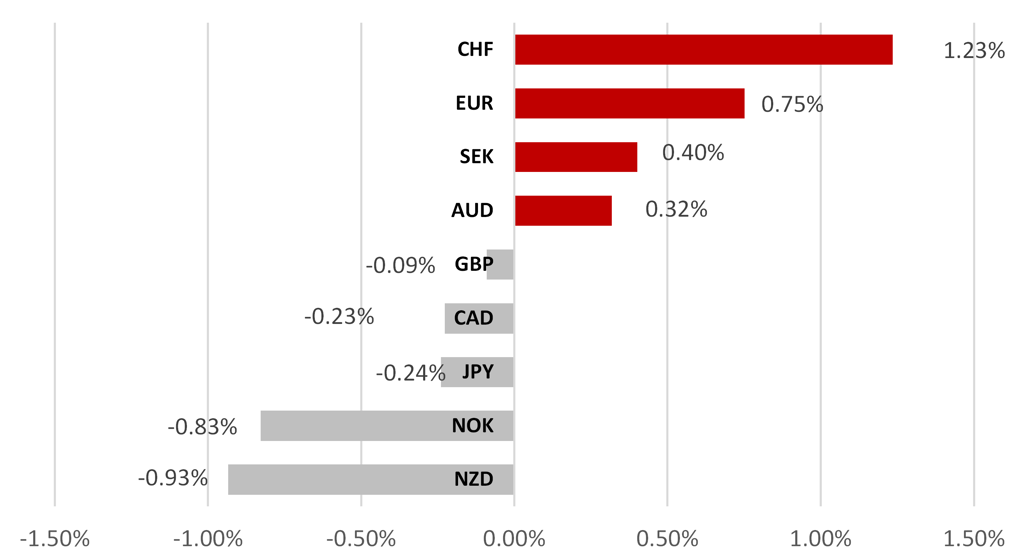
Source: Bloomberg, 12:00 BST, 20th October 2023 (Weekly % Change vs. USD)
Trade Ideas:
Our profit target was hit and hence we are closing our long AUD/NZD trade idea, and recommending a new short GBP/CAD trade idea.
JPY Flows:
This week we analyse the monthly International Transactions in Securities for September when Japanese investors were heavy buyers of foreign bonds, which was again dominated by Japan banks. Foreign investors sold nearly JPY 5.5trn worth of Japan stocks, a record total. After the Topix hit the highest level since 1990, foreign investors appear to have been quick to lock in some profit.
Sentiment Analysis on the Fed Beige Book:
Our natural language sentiment indicator of the wording in the latest Beige book to describe the US economy shows that on balance there was a greater share of negative words overall. It was the most negative sentiment score since May. It stands in contrast to the trend for most of this year of improving sentiment scores. The deterioration in the overall sentiment score was driven mainly by more negative descriptions of the economy, the consumer, housing and financial conditions.
FX Views
EUR: ECB policy focus set to further shift to the balance sheet
The key macro event for the financial markets next week will be the ECB monetary policy announcement on Thursday. After raising the key policy rate by 25bps to 4.00% in September, the ECB altered its forward guidance in the accompanying statement. The message that “Governing Council considers that the key ECB interest rates have reached levels that, maintained for a sufficiently long duration, will make a substantial contribution to the timely return of inflation to target” is very likely to be repeated in the statement in Thursday. This will be no surprise to the financial markets with the OIS market currently indicating precisely zero basis points of tightening by the ECB at next week’s meeting and a mere 3bps by the end of the year. So the tone of President Lagarde’s comments and certain aspects of ECB policy management will be the key determinant of market moves in the period following the announcement.
Given Fed Chair Powell’s comments in his speech yesterday, market participants will want to know how much emphasis the ECB might now be placing on financial conditions as a factor possibly shaping ECB thinking on the level of restrictiveness of the monetary stance. Short-end (2yr yield) rates are unchanged since the last ECB policy meeting but the 10yr yield is 28bps higher. The Euro Stoxx 600 is down 3.8% currently while the ITRAXX EUR CDSI has jumped to the highest level since May and the IG Credit spread has widened by about 10bps. The EUR EER-42 has weakened by about 0.6%. Clearly financial conditions have tightened in Europe as well and President Lagarde may well make a similar comment to Fed Chair Powell that there has been a considerable/significant tightening of financial conditions.
Of course, again similar to Powell, Lagarde will also emphasise the fact that inflation remains too high and that more work is required to bring inflation back to target. This is consistent with the updated guidance that rates need to remain at this level for a “sufficiently long duration”. But the news on inflation since the last meeting has certainly been positive with the September inflation readings falling more sharply than expected. The headline annual CPI rate fell from 5.2% to 4.3%, 0.2ppt more than expected while the core rate fell from 5.3% to 4.5%, 0.3ppt more than expected. The ECB forecast update in September has headline inflation at 5.6% for this year and 3.2% next year (core 5.1% & 2.9%) and with a very favourable base-effect for October, the forecasts from the ECB remain achievable. Of course the developments over the coming weeks in the crude oil market could alter that scenario and remains a key risk. Offsetting that risk though is the fact that the technical assumption for the euro-zone long-term yield is now about 15-20bps higher than assumed in the September forecasts.
BTP/BUND SPREAD SET TO GET MORE FOCUS
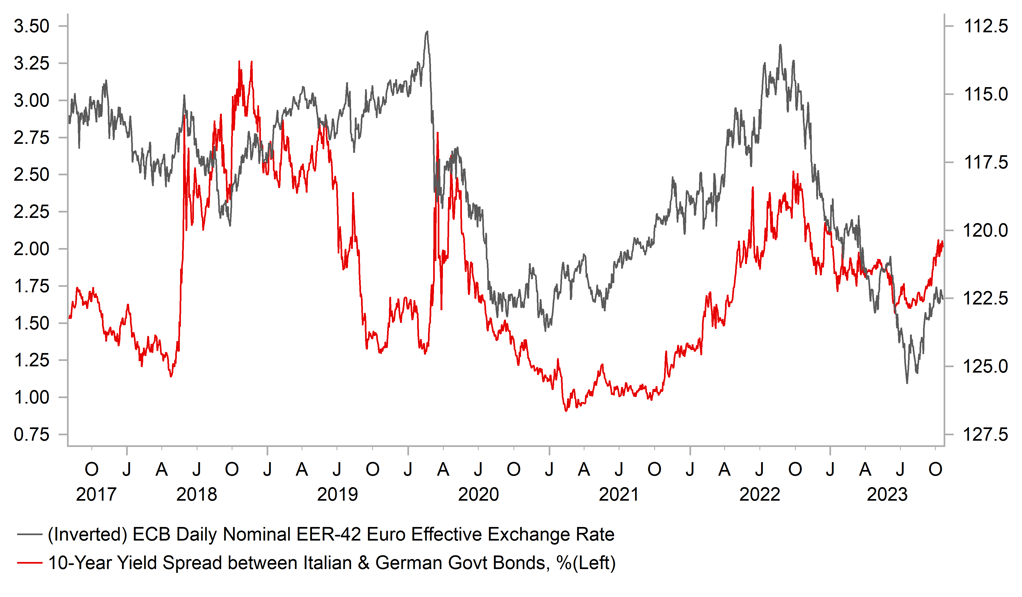
Source: Bloomberg, Macrobond & MUFG GMR
GERMANY ENERGY-INTENSIVE PRODUCTION HIT BAD
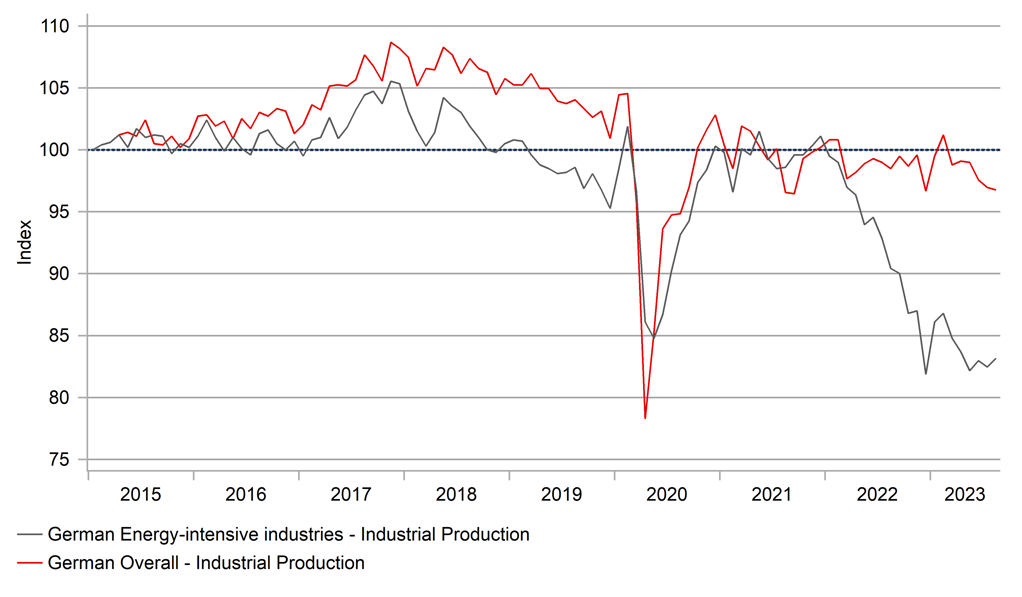
Source: Bloomberg, Macrobond & MUFG GMR
The higher longer-term yields the ECB faces is it meets next week will likely underline caution in relation to communicating guidance on balance sheet policy. We already know that under the APP program, all maturing securities are rolling off which on average equates to about EUR 27bn per month over the next 12mths. On top of that we know that by the end of next year the outstanding TLTROs will also mature from the ECB’s balance sheet. That equates to around EUR 900bn of further balance sheet shrinkage by the end of 2024 if we make the assumption of the APP average roll-off rate remaining unchanged beyond the 12mth period in which data is available. We suspect the ECB will continue to refrain from signalling an appetite for outright sales of securities under the APP program.
What is perhaps more plausible is a shift in guidance on the commitment to continue reinvesting all maturing securities under the PEPP program through to the end of 2024. We don’t think the ECB will alter its formal guidance next week but there is certainly a much higher risk that in the Q&A President Lagarde acknowledges for the first time that a discussion in regard to PEPP plans in 2024 took place at the meeting. That mere acknowledgement would raise considerably expectations of a change in PEPP policy to a tiered slowdown in PEPP reinvestments possibly from the start of next year. However, given the rout taking place at the long-end of bond markets it would be a risky strategy and it’s plausible this acknowledgement is left until December. If Lagarde does confirm a discussion took place we would likely see a clear reaction, in particular in the BTP market. The spread over Bunds on the 10yr broke above 200bps this month to reach levels not seen since December. The EUR 24bn tax cut and fiscal deficit slippage confirmed by Rome is reinforcing upward pressure. Perhaps this could even incentivise the ECB to signal a change. We would class BTP market developments as a key downside risk for EUR at present. A three-month rolling correlation of the BTP/Bund spread and EER-41 EUR is currently at -0.85.
EUR/USD has shown considerable resilience of late despite the move in rate spreads clearly favouring the US. Crude oil prices are higher since the Hamas attack on Israel and TTF natural gas prices are about 40% higher. Even prior to the Hamas attack, Germany was already suffering from the still elevated natural gas price relative to pre-pandemic levels. A further rise from here would likely put renewed downward pressure on EUR/USD. Record levels of crude oil production in the US underlines the favourable terms of trade shift for the dollar. The primary FX downside risk on top of this for EUR would be the ECB acknowledging next week that it discussed its PEPP policy guidance for 2024. That would likely fuel a widening of the BTP/Bund spread and would be made worse if there was explicit criticism of Italy and any hint that the ECB’s TPI is not a tool to be used to protect governments from adopting inappropriate fiscal policies.
STRONG NEGATIVE CORRELATION EUR & BTP SPREAD
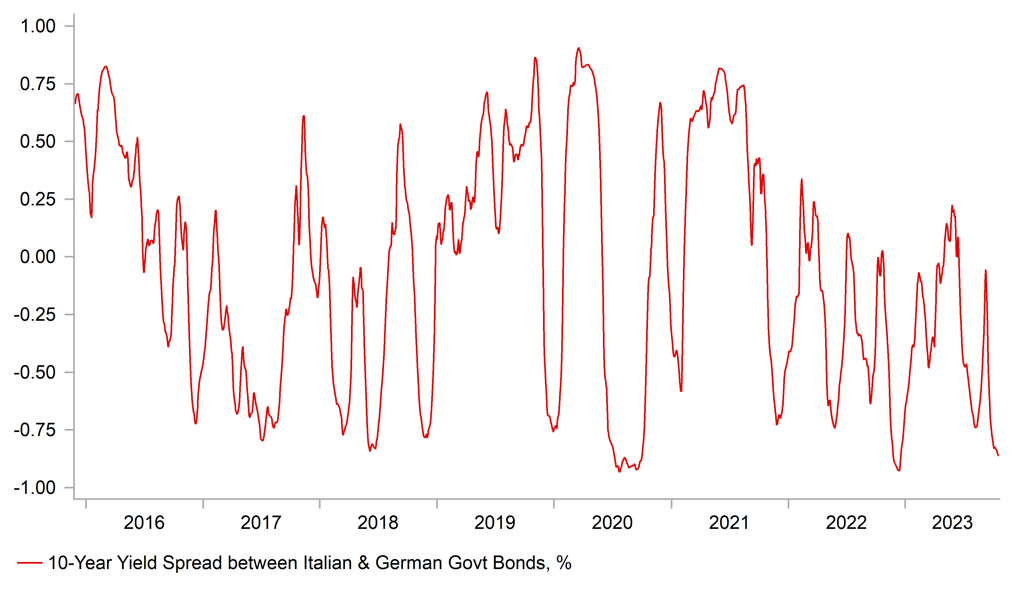
Source: Bloomberg, Macrobond & MUFG GMR
EUR VS G10 EX-USD REMAINS RESILIENT
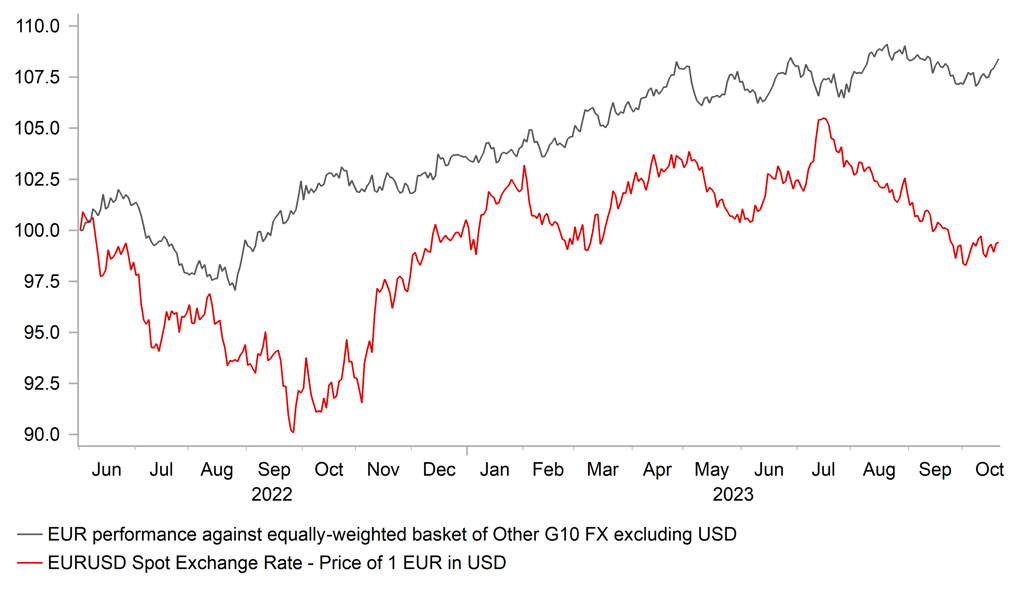
Source: Bloomberg, Macrobond & MUFG GMR
CAD: Weighing up risks for CAD ahead of BoC’s upcoming policy meeting
The CHF has been the main beneficiary amongst G10 currencies from the recent pick-up in geopolitical risk in the Middle East. It has strengthened by around +1.4% against the USD since the conflict between Hamas and Israel started on 7th October. The other main impact in financial markets has been the rebound in the price of oil which has risen by around +11.5% over the same period. However, the higher price of oil has not yet offered more support for the oil-related G10 currencies of the CAD and NOK that have fallen by -0.9% and -2.1% against the USD. In particular, USD/CAD has become less correlated to oil price performance over the last three months. Last year’s performance does though suggest that the CAD could outperform initially if the conflict in the Middle East broadened out and triggered a spike higher in the price of oil. The CAD strengthened by 8.5% against an equally-weighted basket of other G10 currencies in the first 7 months of last year driven in part by the Ukraine conflict that resulted in the price of oil trading above USD100/barrel between March to July 2022.
Another important reason why the CAD outperformed in the first 7 months of last year was due to the hawkish repricing of BoC rate hike expectations that resulted in yield spreads between Canada and other major economies moving in favour of a stronger CAD. The BoC had just started their rate hike cycle early last year and quickly lifted rates from a low of 0.25% in February to 2.50% by July. The current set up is unlikely to be as favourable for the CAD. The BoC is close to the end of their rate hike cycle. We expect the BoC to leave rates on hold at next week’s meeting while maintaining guidance that they “are prepared to increase the policy rate further if needed”.
Speculation over one further rate hike has diminished over the past week after core inflation measures dropped back in September, although they remain uncomfortably high for the BoC between 3.50% and 4.00%. Unlike in the US, Canada’s economy has been expanding below potential so far this year (+1.1%YoY in July) which should help to further ease domestically driven inflation. The Canadian rate market is currently pricing in only 4bps of hikes for next week, and 7bps by December, which suggests that the CAD could prove more sensitive to a hawkish BoC policy surprise in the near-term. Beyond this year though we believe that the Canadian rate market is currently under-pricing the risk of BoC rate cuts. There are only around -6bps of cuts priced by the end of next year compared to -60bps for the Fed even as Canada’s economy is already responding more negatively to higher rates than in the US.
In these circumstances, the CAD stands to benefit initially if the conflict in the Middle Eat broadens out and the price of oil rises above USD100/barrel. However, the BoC policy outlook is not as favourable so upside potential should be less than last year. We are recommending a new short GBP/CAD trade idea.
HIGHER PRICE OF OIL TO PUSH GBP/CAD LOWER
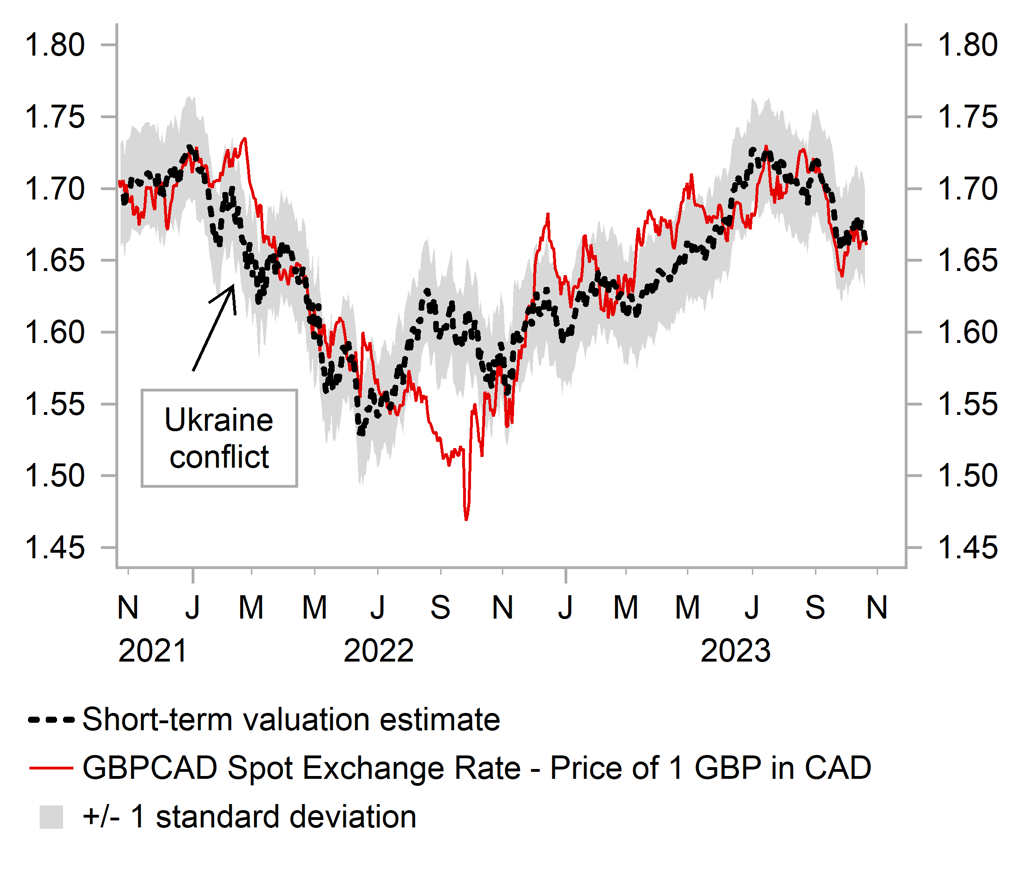
Source: Bloomberg, Macrobond & MUFG
CAD SHORTS & GBP LONGS ARE BOTH STRETCHED
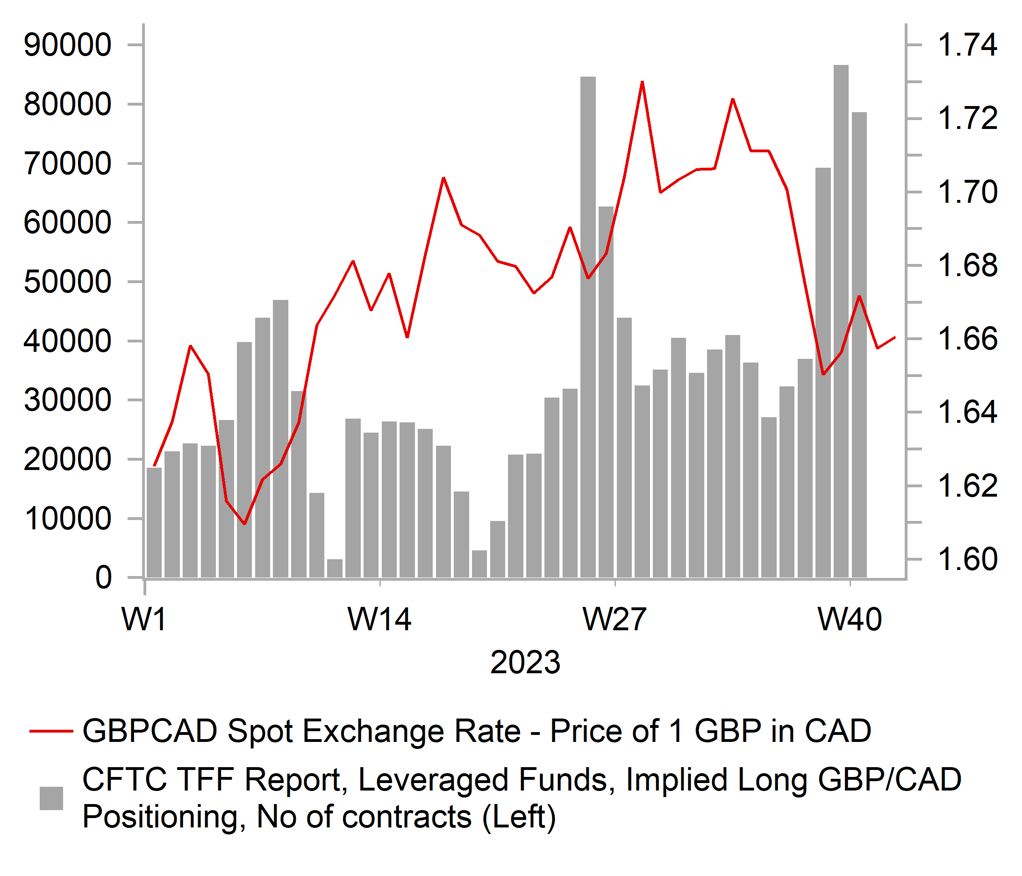
Source: Bloomberg, Macrobond & MUFG
Weekly Calendar
|
Ccy |
Date |
BST |
Indicator/Event |
Period |
Consensus |
Previous |
Mkt Moving |
|
EUR |
10/23/2023 |
15:00 |
Consumer Confidence |
Oct P |
-- |
- 17.8 |
!! |
|
JPY |
10/24/2023 |
01:30 |
Jibun Bank Japan PMI Composite |
Oct P |
-- |
52.1 |
!! |
|
GBP |
10/24/2023 |
07:00 |
Employment Change 3M/3M |
Aug |
-200k |
-207k |
!!! |
|
EUR |
10/24/2023 |
09:00 |
Euro Area Bank Lending Survey |
!!! |
|||
|
AUD |
10/24/2023 |
09:00 |
RBA's Bullock-Speech |
!! |
|||
|
EUR |
10/24/2023 |
09:00 |
HCOB Eurozone Composite PMI |
Oct P |
-- |
47.2 |
!!! |
|
GBP |
10/24/2023 |
09:30 |
Output Per Hour YoY |
2Q F |
-- |
0.1% |
!! |
|
GBP |
10/24/2023 |
09:30 |
S&P Global/CIPS UK Composite PMI |
Oct P |
-- |
48.5 |
!!! |
|
USD |
10/24/2023 |
14:45 |
S&P Global US Composite PMI |
Oct P |
-- |
50.2 |
!! |
|
AUD |
10/25/2023 |
01:30 |
CPI YoY |
3Q |
5.2% |
6.0% |
!!! |
|
EUR |
10/25/2023 |
09:00 |
Germany IFO Business Climate |
Oct |
-- |
85.7 |
!! |
|
EUR |
10/25/2023 |
09:00 |
M3 Money Supply YoY |
Sep |
-- |
-1.3% |
!! |
|
CAD |
10/25/2023 |
15:00 |
Bank of Canada Rate Decision |
5.0% |
5.0% |
!!! |
|
|
USD |
10/25/2023 |
15:00 |
New Home Sales |
Sep |
684k |
675k |
!! |
|
GBP |
10/26/2023 |
11:00 |
CBI Retailing Reported Sales |
Oct |
-- |
- 14.0 |
!! |
|
EUR |
10/26/2023 |
13:15 |
ECB Deposit Facility Rate |
-- |
4.00% |
!!! |
|
|
USD |
10/26/2023 |
13:30 |
Advance Goods Trade Balance |
Sep |
-$85.5b |
-$84.3b |
!! |
|
USD |
10/26/2023 |
13:30 |
GDP Annualized QoQ |
3Q A |
4.0% |
2.1% |
!!! |
|
USD |
10/26/2023 |
13:30 |
Durable Goods Orders |
Sep P |
1.1% |
0.1% |
!! |
|
USD |
10/26/2023 |
13:30 |
Initial Jobless Claims |
-- |
-- |
!! |
|
|
EUR |
10/26/2023 |
13:45 |
ECB President Lagarde Press Conference |
!!! |
|||
|
USD |
10/26/2023 |
15:00 |
Pending Home Sales MoM |
Sep |
-- |
-7.1% |
!! |
|
JPY |
10/27/2023 |
00:30 |
Tokyo CPI YoY |
Oct |
2.7% |
2.8% |
!! |
|
SEK |
10/27/2023 |
07:00 |
Retail Sales MoM |
Sep |
-- |
0.2% |
!! |
|
EUR |
10/27/2023 |
09:00 |
ECB Survey of Professional Forecasters |
!! |
|||
|
USD |
10/27/2023 |
13:30 |
PCE Deflator YoY |
Sep |
3.4% |
3.5% |
!!! |
|
USD |
10/27/2023 |
15:00 |
U. of Mich. Sentiment |
Oct F |
63.2 |
63.0 |
!! |
Source: Bloomberg, Macrobond & MUFG GMR
Key Events:
- The BoC and the ECB will be the latest G10 central banks to provide a policy update in the week ahead. The Canadian rate market has scaled back expectations for further BoC rate hikes after the release of the softer than expected Canadian CPI report for September although it continued to show core inflation remaining uncomfortably high. We expect the BoC to leave rates on hold and to maintain forward guidance that they “are prepared to increase the policy rate further if needed”.
- We expect the ECB to leave their policy rate on hold as well in the week ahead. Policymakers are likely to discuss in more detail plans to tighten policy through liquidity management and balance sheet reduction. PEPP reinvestments will likely be discussed although a final decision which maps out detailed plans on how to allow maturing assets to roll off appears unlikely so soon. The release of latest PMI surveys from euro-zone for October will be scrutinized closely to assess growth momentum at the start of Q4. Business confidence picked up modestly in September but remained at level consistent with GDP contraction in Q3 as a whole. The ECB will also have the results of the latest Euro Area Bank Lending. A further tightening of bank lending conditions should make the ECB cautious over hiking rates further.
- The main economic data releases from the US in the week ahead include the latest GDP report for Q3 and PCE deflator report for September. The GDP report is expected to reveal that the US economy expanding robustly by over 4% in Q3 which is around double the run rate over the last couple of years. Growth has been boosted by temporary factors which should result in some payback weakness in Q4. The PCE deflator is expected to revealed that core inflation has slowed in recent months giving the Fed more leeway to keep rates on hold at the November FOMC meeting.



